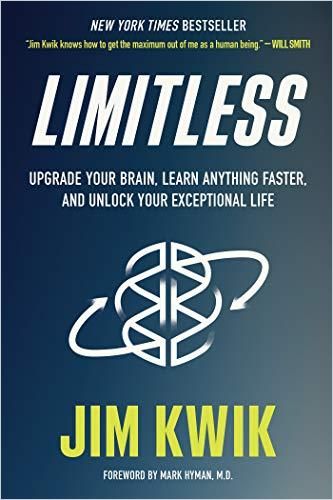Jim Kwik details his recovery from a brain injury and how that inspired him to create how-to methods for developing a positive mind-set, retaining what you read and stilling negative interior voices.

Small Steps, Big Goals
Self-doubt is the biggest obstacle preventing most people from achieving their objectives. Living a life without limits, according to “brain coach” Jim Kwik, means quieting the negative voices in your head that question your competence or intelligence. In this valuable guide to self-improvement, Kwik offers sage advice for transforming your attitude and approach to life. His techniques require practice, but the potential dividends seem worth the time and effort.
Broken Brain
When Jim Kwik was in kindergarten, he fell headfirst into a classroom radiator and suffered a life-altering brain injury. Once energetic and inquisitive, he became withdrawn and developed learning difficulties. An elementary school teacher called him “the boy with the broken brain” – a damaging characterization Kwik consciously embodied throughout high school.
Kwik relates how a friend’s father showed him a room packed with books and asked him to promise to read one a week. Between school reading and his new commitment, Kwik sacrificed eating, sleeping, socializing and exercise.
Our capacity to learn is limitless; we simply need to be shown how to access it.Jim Kwik
Kwik realized that he never understood how to educate himself. He read books on learning theory, neuroscience, speed reading and more. Kwik’s focus and concentration improved. His reading and comprehension increased dramatically, boosting his confidence and motivation.
Creating a limitless life means breaking free of the boundaries your family, society and personal experiences impose on you. Achieve your full potential by examining and changing the core beliefs, perspectives and presumptions that shape how you feel about yourself and the world. Your motivation is your impetus for taking action and provides the energy you need.
Reading and Remembering
Forgetting what you read or learn is commonplace. People forget roughly half of what they learn within 60 minutes, and 70% of it within a day. Concentration drops off after 40 minutes – if not sooner. To maximize your efficiency, Kwik endorses Francesco Cirillo’s Pomodoro Technique: Focus on one task for 25 minutes, then take a five-minute break.
Kwik offers Pomodoro techniques that will improve your comprehension and retention: Set your timer for 25 minutes and focus on what you’re reading. When the alarm sounds, close your book and write down what you learned. Don’t ignore thoughts or ideas that occur as you read. Jot them down. Schedule reading times on your calendar. Before reading, write down what you recall from your last session. Then, Kwik urges, consider how, why and when you can apply your acquired knowledge.
Negative Voices
Most people believe they have limitations and heed the negative voices in their heads. Kwik tells you how to transcend those defeatist messages and how to forestall anxiety and depression by embracing positivity.
Being aware of how you’re holding yourself back with your self-talk and spending some time to get to the source of these beliefs is extremely liberating.Jim Kwik
Be aware when you tell yourself you’re incompetent. Seek the origin of these beliefs. Take pride in your accomplishments and keep them in mind moving forward. Use those accomplishments to contradict any negative voices that arise.
The cultural narrative surrounding IQ scores suggests you can’t raise your intelligence level. That is not true; in fact, a huge difference exists between test results and learning ability. How you apply your intelligence is what matters.
Don’t allow mistakes to define you as a failure. Use them as building blocks for success. Learning is a matter of patience, persistence and adaptability. Tune out any naysayers in your life to achieve your potential.
Motivation
As with mind-set, motivation is adjustable. Motivation, Kwik stresses, is active, not passive. He offers a not entirely comprehensible and certainly forgettable formula: “Motivation = Purpose x Energy x S3 (small, simple steps).” Happily, Kwik explains it – purpose is the reason you act and energy provides the fuel. Small, simple steps that move you toward your objectives become habits through repetition.
Determine your purpose by asking why you set certain goals. Goals should be definitive, measurable and pragmatic. Purpose provides incentive. You don’t necessarily want to go to the gym at 4:35 a.m., for example, but health is one of your priorities, so you go.
Define your purpose and goals and develop the physical and mental energy to sustain your motivation. The human brain requires different nutrients than your other organs demand. Eliminate refined sugar, which diminishes brain function and contributes to depression. Eat more vegetables, fish, eggs and dark chocolate. Consider adding supplements. Dehydration can cause fatigue, so drink sufficient water daily. An undeniable, positive connection exists between aerobic activity and brain function. As little as 10 minutes of daily exercise brings palpable benefits.
Quality sleep sustains your life and brain. Sleep enables the brain to clear away waste that accumulates during the day. Sleep and exercise bring mutual advantages; even people with chronic insomnia benefit from regular, moderate exercise.
Small Steps
Procrastination keeps people stuck, even when they have defined goals and sufficient motivation. You may procrastinate when your tasks overwhelm you. You develop guilty feelings and punish yourself for what you haven’t accomplished.
Most people do not know how to study effectively, because they were never taught.Jim Kwik
Breaking down tasks into smaller steps makes them more manageable. Repetition of small, simple steps creates habits. Roughly half of your actions result from habits. Take small, unthreatening steps toward your goal to build lasting positive behavior.
Self-Loathing to Confidence
Jim Kwik’s saga is not rags to riches. His journey went from profound self-loathing to confidence and a new understanding of his own considerable intelligence. That is not the usual journey for self-help authors, and Kwik’s advice – or at least his techniques for improvement – proves as unique as his life story. Like many self-educated authors, Kwik can be somewhat didactic, and he’s breathless in his enthusiasm, which might wear you out. But he writes with real verve and compassion, evoking Brené Brown, which is high praise. And every one of his techniques are actionable and easy to put into practice.





